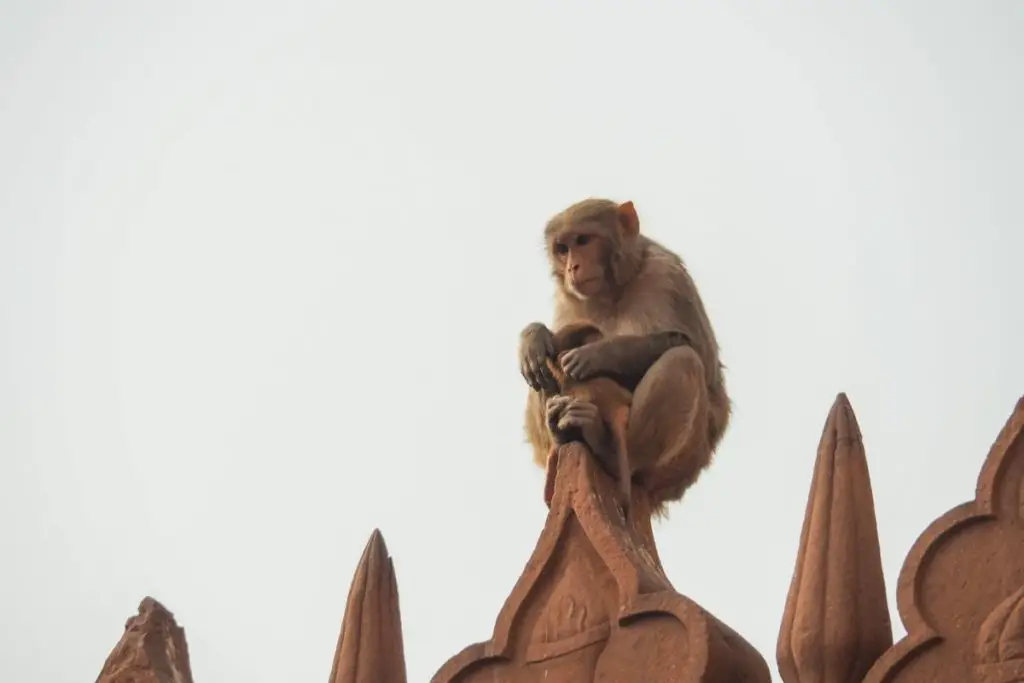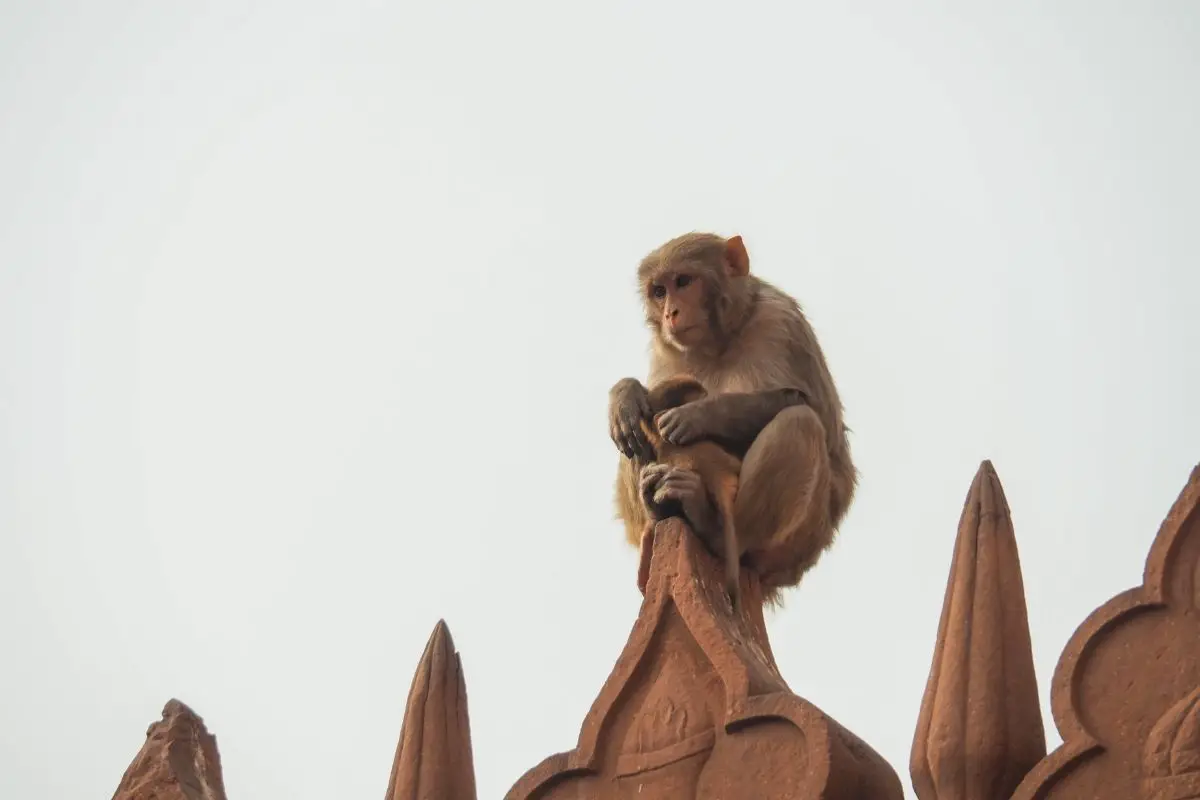You are in India and are looking for an exotic pet, but are unsure if you are allowed to keep that animal. Well this blog post will answer all your questions!
Let’s start with the most important one; Are pet monkeys legal in India?
Pet Monkeys are not legal in India. Monkeys can’t be kept as pets, sold, or used for entertainment purposes in India. and trained for entertainment purposes in India. Monkeys are regarded as an incarnation of Hanuman, the devout in Lord Shri Ramchandra’s Hinduism, and many devout Hindus feed monkeys for this reason.
So, although you will see a lot of monkeys in India, especially around temples where they roam freely, you can’t keep one as a pet. There is a lot more to it, and you can also have other exotic pets. So, stick around as we dig deeper and answer all of these questions and more.
Contents
Why are pet monkeys illegal in India?

Monkeys are a big deal in India. They are considered an incarnation of Hanuman, a devout Hindu in Lord Shri Ramchandra’s Hinduism religion, and many devout Hindus feed monkeys for this reason.
Under Section 22 (ii), PCA Act 1960, Monkeys can not be kept as pets.
The Prevention of Cruelty to Animals Act was passed in 1960 and has since been amended to ban the infliction of needless pain and suffering on animals. The Animal Board of India, a foundation for the advancement of animal welfare, was established after this Act went into force. Captive animals are defined under s. 2(c) and (d).
Can you adopt a pet monkey in India?
You can not adopt a pet monkey in India in the sense of keeping one in your house, but there are many rescue groups that will allow you to virtually adopt a monkey by paying a monthly fee to support the monkey of your choice in exchange for some gifts and even some time with the monkeys at their facility – supervised of course.
The only monkey you can keep in India
Surprisingly enough, there is one monkey that is legal to keep in India: Chimps. Although they are not monkeys to be accurate, they are primates.
Since Chimpanzees are not native to India, they are not protected by the Indian Wildlife Act because the act only protects Indian wildlife (ie, wildlife native to the Indian subcontinent).
However, it is now considered an endangered species, which might lead to difficulties with customs. However, if you can locate someone who will export a chimpanzee with a Cites certificate, you may lawfully keep one as a pet.
However, keeping a chimp at home is not a good idea.
Chimpanzees (Pan troglodytes), which can reach a height of nearly 5 feet and weigh more than 150 pounds, are the world’s smallest great apes. Chimps grow to adulthood in only 5 years, by which time they are as tall as an average woman and stronger than an average adult male.
If you want to own a pet chimp, prepare for it to be with you for the long run. These primates are highly dangerous and have previously maimed and killed people. The majority of chimpanzees kept as pets will eventually go to a laboratory research facility.
Chimps are also rather costly. In fact, some pet chimps can command a price tag exceeding $60,000. They’re also very pricey to maintain. They require a large space, an abundance of food, and frequent vet visits.
Most veterinarians will not work with chimps either because it is too difficult, because their clinics or offices are not prepared for it, or owing to the risk that a chimp might pose to the other animals they are treating as well as employees.
If you are interested in learning more about this, check out this guide to living with the largest pet monkey here.
What pet monkeys do people keep in India?
Despite it being illegal, many people keep monkeys as pets in India, and you can find monkeys for sale pretty easily in large animal markets around the country. However, most of the monkeys you will find there are smaller monkeys like Marmosets.
You can learn about other small monkeys that are good as pets here.
What exotic pets are legal in India?

There are a surprising number of exotic pets kept privately in India. The trend in India, as is with the rest of the world, for pet owners is going away from your normal dogs and cats to more exotic animals.
This truth has surfaced to light after the Indian Government required all citizens that are keeping exotic pets privately in their home to declare them to the authorities or face some dire consequences.
There is no official list about the animals declared, but even the information that was declared and the stories that leaked to the news sites in the country have been surprising. Around 32,000 Indians have declared they are keeping exotic pets privately.
Some of the exotic animals that people keep as pets in India include:
- Exotic birds species including eagles, macaws, cockatiels, and parrots
- Exotic primates such as Lemurs and Marmosets
- Horses – especially miniature horses like the Flabella
- Fish – including exotics like Flowerhorn, Ramora, Yellow Tang, Clown Fish, Fox Face, and Korean Angel.
- Alligators
- Guinea Pigs
- Exotic breeds of dogs and cats such as the Persian and Siamese cats
- Donkeys
Conclusion
While it is illegal to keep monkeys as pets in India, the laws banning this only apply to species native to India, which means thousands of people still keep monkeys and other exotic pets in India using loopholes.
Many people also keep exotic pets illegal in India hidden and in secret. Unfortunately, wet markets in India are still a huge problem and they are feeding the global exotic pets trade, which is not only illegal but also cruel and horrible.
We highly encourage you to adopt a dog or a cat from a rescue near you and leave the monkeys and other exotic animals to enjoy their life in the wild as they are meant to. If you are from the US, you can also learn about the laws and legalities of owning a pet monkey in the US here.
Helpful Resources
32,000 Indians Say They Possess Exotic Animals In Post-COVID Amnesty
The Wild Life (Protection) Act, 1972
If you like this article, please share it!

